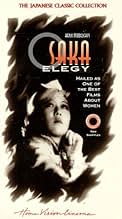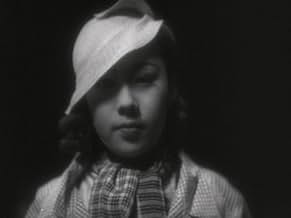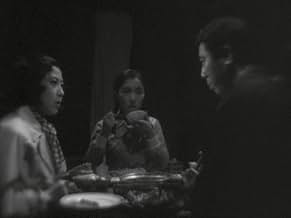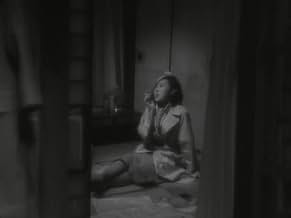NOTE IMDb
7,2/10
2,7 k
MA NOTE
Une jeune femme devient la maîtresse de son patron pour pouvoir subvenir aux besoins de sa famille.Une jeune femme devient la maîtresse de son patron pour pouvoir subvenir aux besoins de sa famille.Une jeune femme devient la maîtresse de son patron pour pouvoir subvenir aux besoins de sa famille.
- Réalisation
- Scénario
- Casting principal
Avis à la une
"Osaka Elegy" (Japanese, 1936): Directed by Kenji Mizoguchi. This is one of his earliest films. Japan was in the throes of a cultural turmoil. They were busy invading China, and feeling the schizophrenia of traditional vs modern society. This story is about a decent young woman, who, when familial pressure is applied, does anything necessary to pay the bills of a pathetic father, a self-centered brother, and a confused, naïve sister, and, a keep an abusive boss "happy". As we might expect (now), her road darkens as everyone demands more and more, gives back less and less, and shuns her for doing what they suggested and made their advantage. Expect a noir-ish look to the film, with spare traditional home sets and costuming, contrasted with high style business/commercial sets and costuming.
The first film included in the Criterion Collewction's "Mizoguchi's Fallen Women", this is the story of Ayako (a pretty great Isuzu Yamada who, according to this website, is still wonderfully with us), who is a switchboard operator who needs 300 yen to prevent her father getting in major trouble. To get the money, she spends time with her boss. This is, of course, little more than being a companion. One of Mizoguchi's gifts as a director (he also wrote the story) is that in many of his films his characters were not sympathetic yet he does not wholly judge the. The key is, what would you do? The film could never be in color, it is a noirish, gray film. The story is compelling, the acting is uniformly good, with Ms. Yamada really standing out, and the direction is, of course, flawless. I've also seen "Sisters Of The Gion" and "Streets Of Shame" from this collection. Buy it! Mizoguchi was one of the giants of 20th century cinema from any country. This film is highly recommended.
This film begins with a relatively wealthy--but extremely grouchy--old man by the name of "Sonosuke Asai" (Benkei Shiganoya) harping on all those around him for very minor issues. It's during this time that his wife "Sumiko" (Yôko Umemura) sarcastically recommends that he gets himself a young mistress since he no longer finds her appealing. That being said, it just so happens that there is a young employee at his office named "Ayako Murai" (Isuzu Yamada) that he finds quite attractive and knowing that she is in desperate need of money due to a family matter offers her the unenviable position. In any case, faced with very little choice she reluctantly accepts his offer. Unfortunately, even though she tries to do what is best for her family, she soon discovers that she has lost the respect of everyone of any consequence to her. Now rather than reveal any more I will just say that I initially thought that this was a comedy as the first few scenes seemed rather light-hearted. But things change rather remarkably later on. On another note, it should be mentioned that silent films lasted a bit longer in Japan than most other industrialized nations and that this was one of the first pictures to utilize sound. Be that as it may, I thought that this was a pretty good movie and I have rated it accordingly. Above average.
...with a plot out of Precode Hollywood and frequent jazz music to match. A pretty young switchboard operator reluctantly decides to become the mistress of her boss so she can help her financially-strapped father who had embezzled company funds for an investment that went bad, and her college-student brother who needs his tuition paid. Of course she is ostracized from the family for her immorality without giving her the chance to explain how they got their money. Various other relationships and subplots also come into play. This one has nicely-plotted character dynamics, good performances, and beautiful cinematography.
10Gonzo-23
It was this film alone that drove me into an intense obsession with cinema. Mizoguchi is the great Japanese master, and Osaka Elegy reveals his genius. From his long take compositions that are taxed with complexity and tension, to his ambigious depictions of character, I felt like I had grown after I had seen this film. Notice the national allegory at the film's conclusion, a confused and lonely Japan. And his inconclusive final shot taken many years before the well known 400 Blows. The devastating melodrama is not undercut by any cinematic manipulation. I highly recommend this to any lover of the cinematic medium. Also, I am a sucker for self-reflexive Kabuki theater sequences...
Le saviez-vous
- Citations
Junzo Murai: You're a woman... Being taken to the police station... Getting thrown into jail... You've done shameful things. You ungrateful child!
Ayako Murai: How could you say that? I never expected that I'd be treated like this when I came home. This is ridiculous! I thought you would welcome me with open arms. If I'd have known this, I never would have come back.
- ConnexionsFeatured in Century of Cinema: Un siècle de cinéma japonais, par Nagisa Oshima (1995)
Meilleurs choix
Connectez-vous pour évaluer et suivre la liste de favoris afin de recevoir des recommandations personnalisées
- How long is Osaka Elegy?Alimenté par Alexa
Détails
- Durée
- 1h 11min(71 min)
- Couleur
- Mixage
- Rapport de forme
- 1.37 : 1
Contribuer à cette page
Suggérer une modification ou ajouter du contenu manquant

























